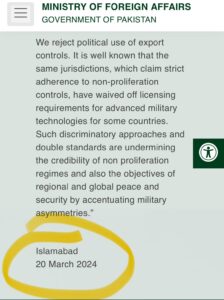
Washington: The United States of America has imposed sanctions on suppliers to Pakistan’s ballistic missile programme. The US Department of State stated today (IST) that it designated four proliferators of weapons of mass destruction and their means of delivery. They supplied missile‐applicable items to Pakistan’s ballistic missile programme, including its long-range missile programme.
 Pakistan hit back today saying it rejects the “political use of export controls”. Its foreign office stated: “It is well known that the same jurisdictions, which claim strict adherence to non-proliferation controls, have waived off licensing requirements for advanced military technologies for some countries. Such discriminatory approaches and double standards are undermining the credibility of non-proliferation regimes and also the objectives of regional and global peace and security by accentuating military asymmetries.”
Pakistan hit back today saying it rejects the “political use of export controls”. Its foreign office stated: “It is well known that the same jurisdictions, which claim strict adherence to non-proliferation controls, have waived off licensing requirements for advanced military technologies for some countries. Such discriminatory approaches and double standards are undermining the credibility of non-proliferation regimes and also the objectives of regional and global peace and security by accentuating military asymmetries.”
Islamabad, however, stated that it was ready to discuss “end-use and end-user verification mechanisms” with Washington to ensure that legitimate commercial users were not hurt by the “discriminatory application” of export controls.
Interestingly, what attracted immediate comments from members of Twitterati was the wrong date put on the official statement by Pakistan’s Ministry of Foreign Affairs. Instead of 20 April 2024, it mentioned “20 March 2024”.
The US State Department yesterday offered the following details on the suppliers to Pakistan’s Ballistic Missile Programme:
- Belarus-based Minsk Wheel Tractor Plant has worked to supply special vehicle chassis to Pakistan’s long-range ballistic missile program. Such chassis are used as launch support equipment for ballistic missiles by Pakistan’s National Development Complex (NDC), which is responsible for developing Missile Technology Control Regime Category (MTCR) I ballistic missiles.
- People’s Republic of China (PRC)-based Xi’an Longde Technology Development Company Limited, has supplied missile-related equipment, including a filament winding machine, to Pakistan’s long-range ballistic missile program that we assess was destined for NDC. Filament winding machines can be used to produce rocket motor cases.
- China-based Tianjin Creative Source International Trade Co Ltd has supplied missile-related equipment to Pakistan’s long-range ballistic missile program, including stir welding equipment (which the United States assesses can be used to manufacture propellant tanks used in space launch vehicles), and a linear accelerator system (which the United States assesses can be used in the inspection of solid rocket motors). Tianjin Creative’s procurements were likely destined for Pakistan’s Space and Upper Atmosphere Research Commission (SUPARCO), which develops and produces Pakistan’s MTCR Category I ballistic missiles.
- PRC-based Granpect Company Limited has worked with Pakistan’s SUPARCO to supply equipment for testing large-diameter rocket motors. In addition, Granpect Co. Ltd. also worked to supply equipment for testing large-diameter rocket motors to Pakistan’s NDC.
As a result of the US action, all property and interests in property of the designated persons described above that are in the United States or possession or control of US persons are blocked and must be reported to the Department of Treasury’s Office of Foreign Assets Control (OFAC).
Additionally, all individuals or entities that have ownership, either directly or indirectly, 50 per cent or more by one or more blocked persons are also blocked. All transactions by US persons or within (or transiting) the United States that involve any property or interests in property of designated or otherwise blocked persons are prohibited unless authorized by a general or specific license issued by OFAC or exempt.
These prohibitions include the making of any contribution or provision of funds, goods, or services by, to, or for the benefit of any blocked person and the receipt of any contribution or provision of funds, goods, or services from any such person. Additionally, the entry of designated individuals into the United States is suspended under a Presidential Proclamation.
The power and integrity of U.S. Government sanctions derive not only from the U.S. government’s ability to designate and add persons to the Specially Designated Nationals and Blocked Persons List (SDN) List but also from its willingness to remove persons from the SDN List consistent with the law. “The ultimate goal of sanctions is not to punish, but to bring about a positive change in behaviour,” the State Department said.
Pakistan Foreign Office spokesperson Mumtaz Zahra Baloch further countered the US move, stating: “While we are not aware of the specifics of the latest measures by the United States, in the past we have come across many instances where listings have been made on mere suspicion or even when the involved items were not on any control lists but were deemed sensitive under catch-all provisions.”
– global bihari bureau





